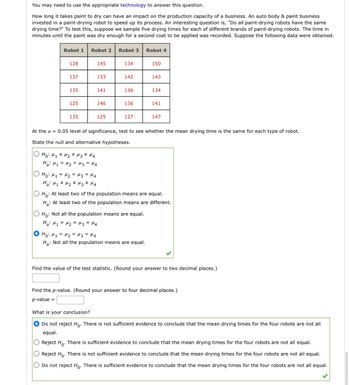
MATLAB: An Introduction with Applications
6th Edition
ISBN: 9781119256830
Author: Amos Gilat
Publisher: John Wiley & Sons Inc
expand_more
expand_more
format_list_bulleted
Question
thumb_up100%
Ch 14

Transcribed Image Text:You may need to use the appropriate technology to answer this question.
How long it takes paint to dry can have an impact on the production capacity of a business. An auto body & paint business
invested in a paint-drying robot to speed up its process. An interesting question is, "Do all paint-drying robots have the same
drying time?" To test this, suppose we sample five drying times for each of different brands of paint-drying robots. The time in
minutes until the paint was dry enough for a second coat to be applied was recorded. Suppose the following data were obtained.
Robot 1 Robot 2 Robot 3
128
137
135
125
135
OO
145
133
но: M1=M2=M3 =14
Ha: M₁ M₂ M3 M4
141
146
125
O Ho: M₁ M₂ M3 M4
#
на: М1 = М2 = из = M4
134
142
136
136
127
Robot 4
Ho: Not all the population means are equal.
Ha: H₁ = H₂ = H3 = H4
O Ho: M₁ = M₂ = μ3 = 14
Ha: Not all the population means are equal.
150
At the α = 0.05 level of significance, test to see whether the mean drying time is the same for each type of robot.
State the null and alternative hypotheses.
143
134
141
147
Ho: At least two of the population means are equal.
H₂: At least two of the population means are different.
Find the value of the test statistic. (Round your answer to two decimal places.)
Find the p-value. (Round your answer to four decimal places.)
p-value =
What is your conclusion?
Do not reject Ho. There is not sufficient evidence to conclude that the mean drying times for the four robots are not all
equal.
Reject Ho. There is sufficient evidence to conclude that the mean drying times for the four robots are not all equal.
Reject Ho. There is not sufficient evidence to conclude that the mean drying times for the four robots are not all equal.
O Do not reject Ho. There is sufficient evidence to conclude that the mean drying times for the four robots are not all equal.
Expert Solution
This question has been solved!
Explore an expertly crafted, step-by-step solution for a thorough understanding of key concepts.
Step by stepSolved in 2 steps with 1 images

Knowledge Booster
Similar questions
Recommended textbooks for you
 MATLAB: An Introduction with ApplicationsStatisticsISBN:9781119256830Author:Amos GilatPublisher:John Wiley & Sons Inc
MATLAB: An Introduction with ApplicationsStatisticsISBN:9781119256830Author:Amos GilatPublisher:John Wiley & Sons Inc Probability and Statistics for Engineering and th...StatisticsISBN:9781305251809Author:Jay L. DevorePublisher:Cengage Learning
Probability and Statistics for Engineering and th...StatisticsISBN:9781305251809Author:Jay L. DevorePublisher:Cengage Learning Statistics for The Behavioral Sciences (MindTap C...StatisticsISBN:9781305504912Author:Frederick J Gravetter, Larry B. WallnauPublisher:Cengage Learning
Statistics for The Behavioral Sciences (MindTap C...StatisticsISBN:9781305504912Author:Frederick J Gravetter, Larry B. WallnauPublisher:Cengage Learning Elementary Statistics: Picturing the World (7th E...StatisticsISBN:9780134683416Author:Ron Larson, Betsy FarberPublisher:PEARSON
Elementary Statistics: Picturing the World (7th E...StatisticsISBN:9780134683416Author:Ron Larson, Betsy FarberPublisher:PEARSON The Basic Practice of StatisticsStatisticsISBN:9781319042578Author:David S. Moore, William I. Notz, Michael A. FlignerPublisher:W. H. Freeman
The Basic Practice of StatisticsStatisticsISBN:9781319042578Author:David S. Moore, William I. Notz, Michael A. FlignerPublisher:W. H. Freeman Introduction to the Practice of StatisticsStatisticsISBN:9781319013387Author:David S. Moore, George P. McCabe, Bruce A. CraigPublisher:W. H. Freeman
Introduction to the Practice of StatisticsStatisticsISBN:9781319013387Author:David S. Moore, George P. McCabe, Bruce A. CraigPublisher:W. H. Freeman

MATLAB: An Introduction with Applications
Statistics
ISBN:9781119256830
Author:Amos Gilat
Publisher:John Wiley & Sons Inc

Probability and Statistics for Engineering and th...
Statistics
ISBN:9781305251809
Author:Jay L. Devore
Publisher:Cengage Learning

Statistics for The Behavioral Sciences (MindTap C...
Statistics
ISBN:9781305504912
Author:Frederick J Gravetter, Larry B. Wallnau
Publisher:Cengage Learning

Elementary Statistics: Picturing the World (7th E...
Statistics
ISBN:9780134683416
Author:Ron Larson, Betsy Farber
Publisher:PEARSON

The Basic Practice of Statistics
Statistics
ISBN:9781319042578
Author:David S. Moore, William I. Notz, Michael A. Fligner
Publisher:W. H. Freeman

Introduction to the Practice of Statistics
Statistics
ISBN:9781319013387
Author:David S. Moore, George P. McCabe, Bruce A. Craig
Publisher:W. H. Freeman